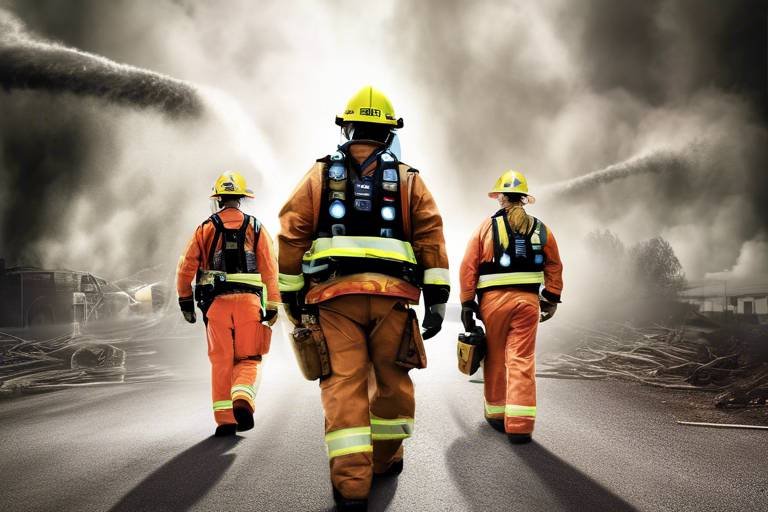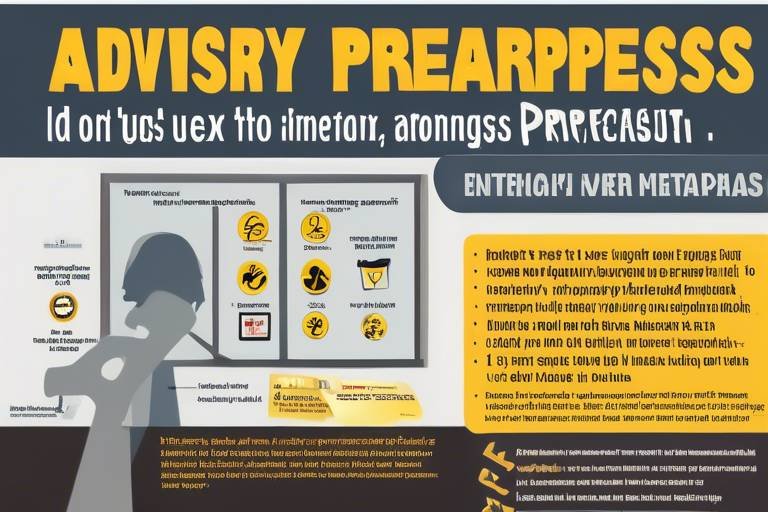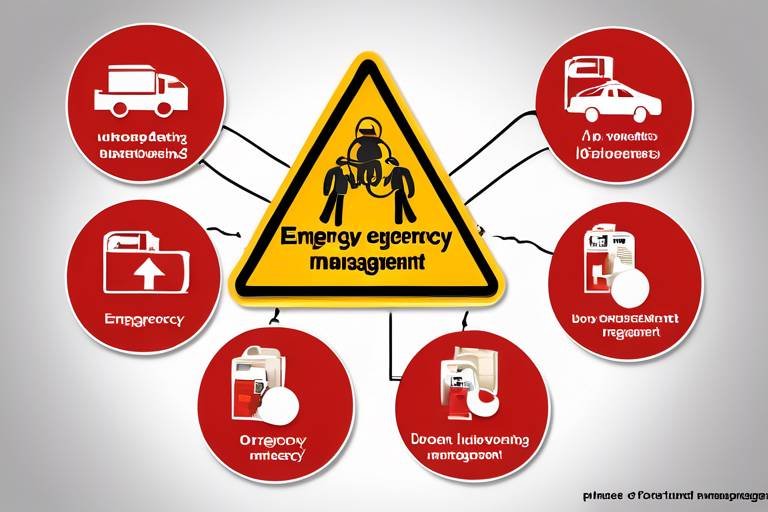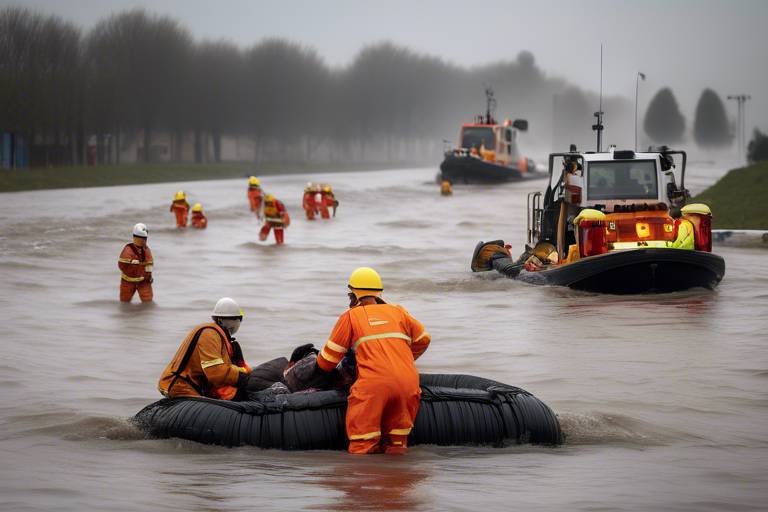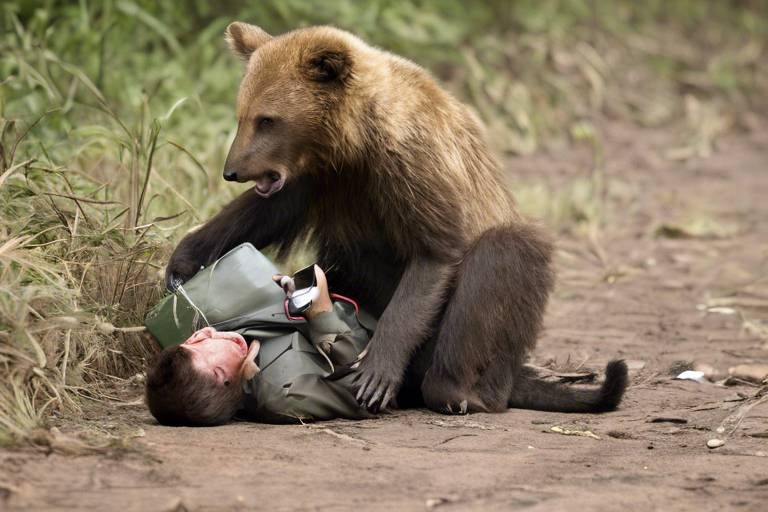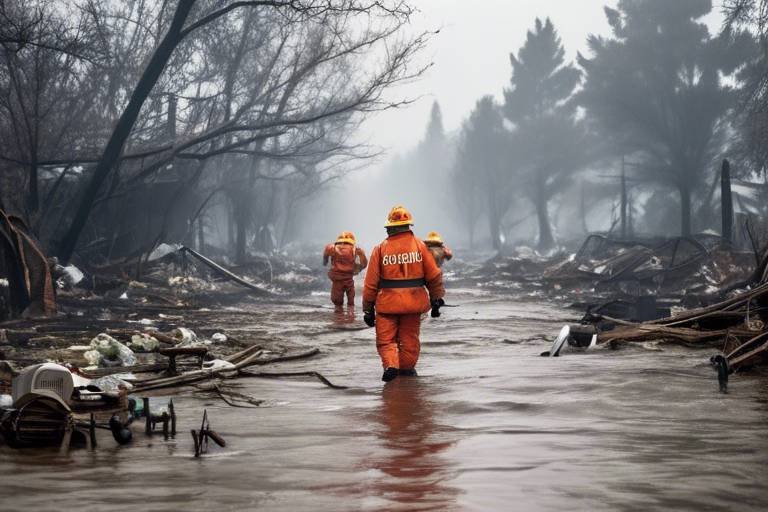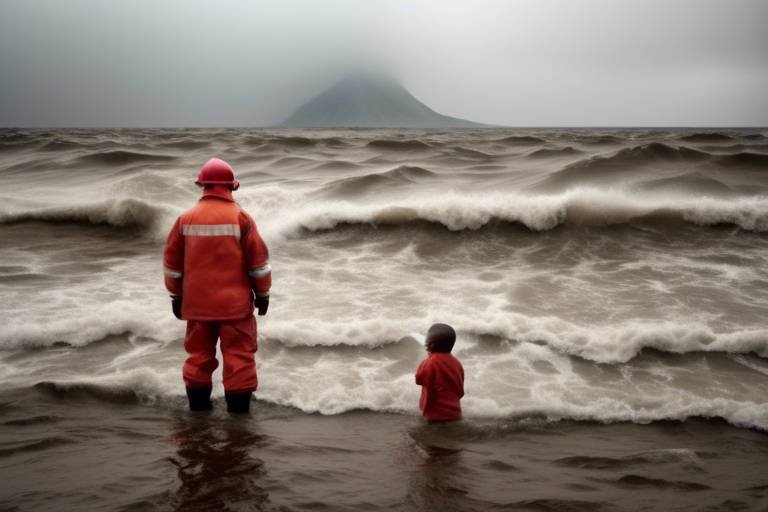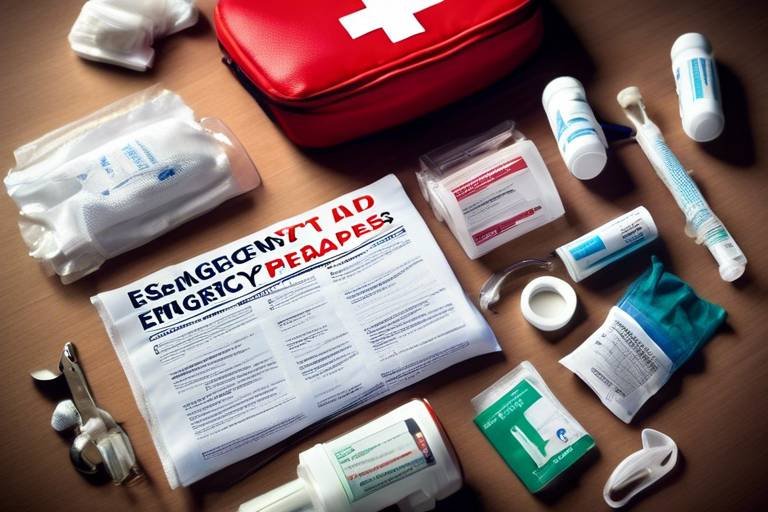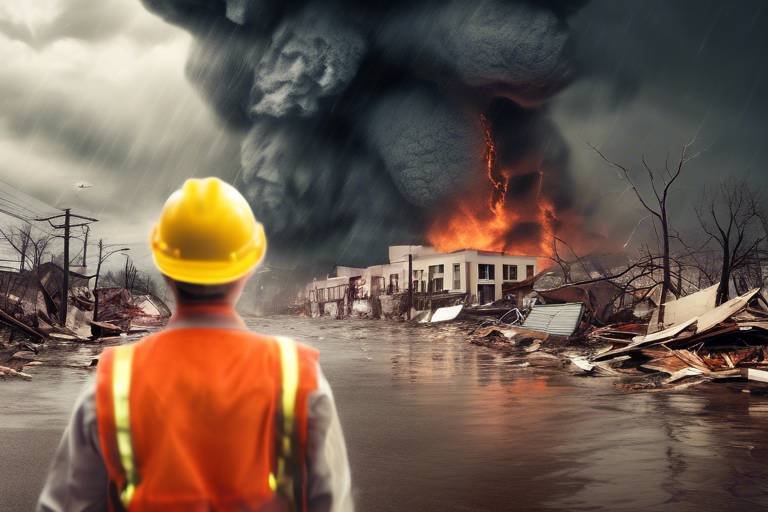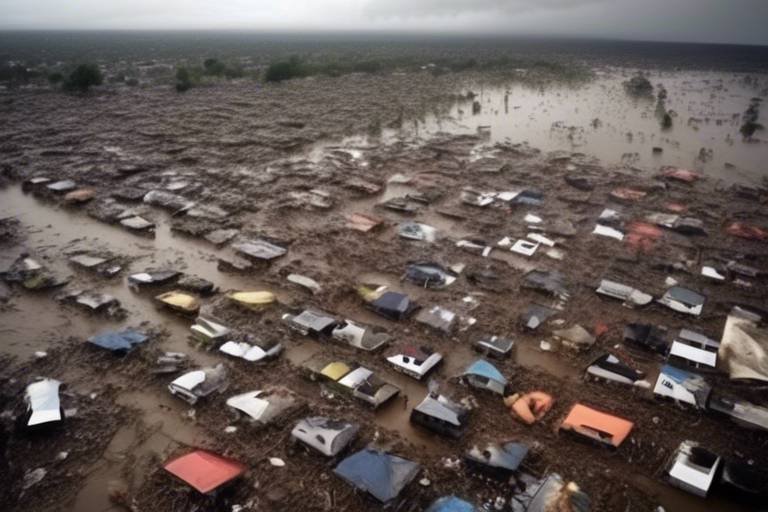Exploring Jobs and Careers in Emergency Response
This article delves into the diverse career opportunities within the emergency response sector, highlighting essential roles, required skills, and pathways for individuals interested in making a difference during crises.
Emergency response careers encompass a variety of roles focused on managing crises, providing aid, and ensuring public safety. These professionals are the backbone of our safety net, stepping in when disaster strikes, whether it's a natural calamity, a medical emergency, or a fire. The significance of these careers cannot be overstated; they are crucial for maintaining order and providing immediate assistance when society needs it most. Imagine a world without these heroes—chaos would reign. Thus, the emergency response sector not only offers fulfilling careers but also allows individuals to contribute meaningfully to their communities.
Various positions exist within emergency response, including paramedics, firefighters, and disaster relief coordinators. Each role comes with its own set of responsibilities and daily tasks that are vital for effective crisis management. For instance, paramedics are often the first on the scene, providing life-saving care, while firefighters tackle blazes and rescue individuals from perilous situations. Disaster relief coordinators, on the other hand, orchestrate the larger picture, ensuring resources are allocated efficiently during widespread emergencies. The synergy among these roles is what makes emergency response a well-oiled machine, ready to spring into action at a moment's notice.
Paramedics and EMTs are vital in providing immediate medical care during emergencies. They are trained to handle a variety of situations, from cardiac arrests to traumatic injuries. Their responsibilities go beyond just medical treatment; they must also assess the situation, communicate effectively with other emergency responders, and often provide emotional support to victims and their families. The challenges they face in high-pressure situations can be daunting, requiring not just medical knowledge but also a calm demeanor and quick decision-making skills.
To become a paramedic or EMT, individuals must undergo rigorous training and certification processes. This typically involves completing a formal education program, which can range from a few months to several years, depending on the level of certification sought. Candidates must also pass a series of exams to demonstrate their knowledge and skills. The educational pathways often include:
- High school diploma or equivalent
- Completion of an accredited EMT or paramedic program
- State licensure and certification
Additionally, ongoing education is crucial as medical protocols and technologies continue to evolve. The commitment to lifelong learning is what sets successful paramedics apart.
Working as a paramedic involves unique challenges, such as high-stress environments and emotional tolls. Imagine racing against time, knowing that every second counts while dealing with life-or-death situations. Paramedics often witness traumatic events that can lead to emotional distress. They must learn to cope with these experiences, which can be both physically and mentally exhausting. Support systems, such as peer counseling and mental health resources, are essential to help them navigate these challenges and maintain their well-being.
Firefighting is another crucial emergency response role, requiring bravery and specialized training. Firefighters are not just responders to fires; they also engage in rescue operations, hazardous materials handling, and community education on fire safety. The responsibilities of a firefighter are vast and can vary significantly from one day to the next. Training requirements include physical fitness tests, firefighting techniques, and emergency medical training. Aspiring firefighters must also be prepared for career progression, which often leads to specialized roles such as fire investigation or fire safety education.
Disaster management roles focus on planning and executing responses to large-scale emergencies. These individuals play a pivotal role in ensuring that communities are prepared for disasters, whether they arise from natural events like hurricanes or man-made incidents. Effective disaster relief coordination requires a blend of skills, including strategic planning, resource management, and effective communication. Coordinators must be adept at working with various agencies and organizations to ensure a unified response.
Successful disaster managers must possess strong leadership, communication, and analytical skills. They need to think on their feet and make quick decisions under pressure. Imagine being in a room filled with chaos, yet you have to steer the ship towards safety—that's the reality for disaster managers. Essential competencies needed to navigate complex emergency situations effectively include:
- Critical thinking and problem-solving abilities
- Excellent verbal and written communication skills
- Ability to work collaboratively with diverse teams
Various pathways lead to careers in disaster relief, including volunteering and formal education. For many, starting as a volunteer can provide invaluable experience and insight into the field. Educational routes often include degrees in emergency management, public administration, or social sciences. Networking with professionals in the field and seeking internships can also open doors to opportunities in disaster relief coordination. Whether through formal education or hands-on experience, the journey into this impactful field is as diverse as the individuals who choose to embark on it.
Q: What qualifications do I need to become a paramedic?
A: Generally, you need a high school diploma, followed by completion of an accredited EMT or paramedic program, and passing state licensure exams.
Q: How can I prepare for a career in firefighting?
A: Focus on physical fitness, seek volunteer opportunities with local fire departments, and consider enrolling in fire science programs to gain essential knowledge.
Q: What skills are essential for disaster management?
A: Key skills include leadership, communication, critical thinking, and the ability to work under pressure.
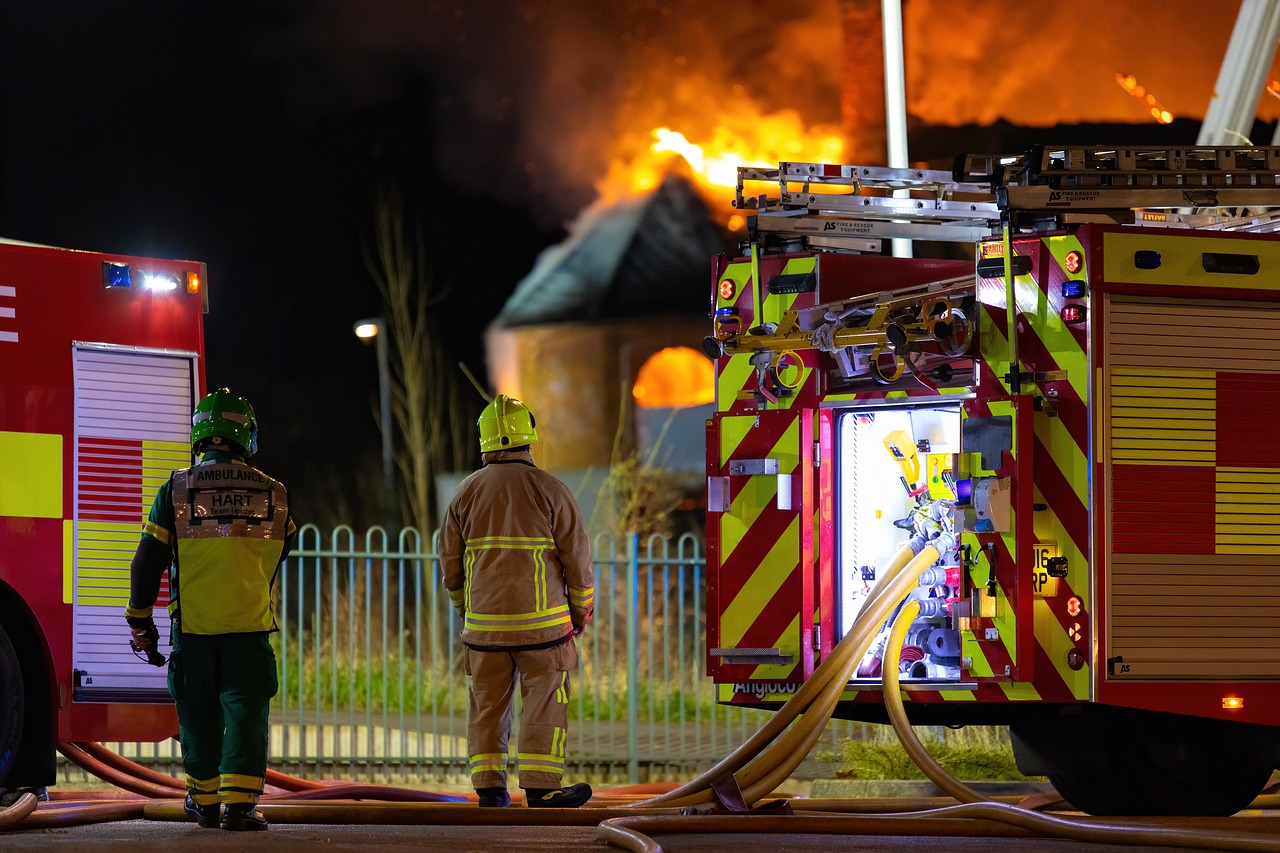
Understanding Emergency Response Careers
Emergency response careers are not just jobs; they are a calling that requires dedication, bravery, and a desire to help others during their most vulnerable moments. These careers encompass a variety of roles focused on managing crises, providing aid, and ensuring public safety. Imagine being the first person on the scene of an accident, or the one who helps a community recover from a natural disaster. It's a world filled with challenges and rewards, where every day can bring something new and unexpected.
The significance of emergency response professionals in society cannot be overstated. They are the backbone of public safety, stepping in during times of need to provide critical support. Whether it's a paramedic rushing to save a life, a firefighter battling flames, or a disaster relief coordinator organizing an effective response to a catastrophe, each role plays a vital part in maintaining the safety and well-being of the community.
One of the most appealing aspects of a career in emergency response is the diversity of roles available. Here are just a few key areas within this field:
- Medical Response: Paramedics and EMTs provide immediate medical care and transport patients to hospitals.
- Firefighting: Firefighters respond to fires, rescue operations, and hazardous material incidents.
- Disaster Management: Coordinators plan for and respond to large-scale emergencies, ensuring resources are effectively utilized.
Each of these roles requires a unique set of skills and training, but they all share a common goal: to protect and serve the community. The emotional and psychological resilience required in these careers is immense. Responders often face high-stress situations, and the ability to remain calm under pressure is critical. Furthermore, the sense of camaraderie among emergency responders fosters a supportive environment, where individuals can rely on each other during tough times.
In summary, understanding emergency response careers means recognizing the profound impact these professionals have on society. They are the unsung heroes who step up when it matters most, and their contributions are essential in creating safer communities. If you have a passion for helping others and a desire to make a difference, a career in emergency response might just be your calling.

Key Roles in Emergency Response
When we think about emergency response, a vivid picture often comes to mind—brave individuals rushing into chaos, equipped with skills and knowledge to save lives. The reality is that the field of emergency response is diverse, encompassing a wide range of roles that each play a critical part in managing crises. From the first responders who arrive on the scene to the coordinators who orchestrate relief efforts, every position is essential in ensuring public safety and well-being during emergencies.
One of the most recognized roles in emergency response is that of the paramedic. Paramedics and Emergency Medical Technicians (EMTs) are often the first healthcare professionals on the scene, providing immediate medical assistance to those in need. Their responsibilities extend beyond just administering first aid; they assess patients, stabilize them for transport, and communicate vital information to hospitals. The training for these roles is rigorous, requiring a deep understanding of medical protocols and the ability to perform under pressure.
Another key player in emergency response is the firefighter. Firefighters are not only responsible for battling blazes but also for rescuing individuals from perilous situations, such as car accidents or natural disasters. Their training involves physical endurance, technical skills in using firefighting equipment, and knowledge of fire science. Firefighters often work in teams, relying on each other for support in high-stress environments. The camaraderie developed in this profession is akin to that of a family, as they face life-threatening situations together.
Beyond these frontline roles, there are crucial positions in disaster management and relief coordination. These professionals focus on planning and executing responses to large-scale emergencies, such as natural disasters or public health crises. They work tirelessly behind the scenes to ensure that resources are allocated efficiently and that communities receive the support they need. Skills in leadership, communication, and analytical thinking are vital for success in these roles, as they must navigate complex situations and make quick decisions that can impact many lives.
To give you a clearer picture of the various roles in emergency response, here’s a brief overview:
| Role | Key Responsibilities | Required Skills |
|---|---|---|
| Paramedics/EMTs | Provide medical care, assess patients, transport to hospitals | Medical knowledge, quick decision-making, communication |
| Firefighters | Extinguish fires, rescue individuals, conduct safety inspections | Physical fitness, teamwork, fire science knowledge |
| Disaster Managers | Plan and coordinate disaster response, allocate resources | Leadership, communication, analytical skills |
As you can see, each role is interconnected, forming a comprehensive network of support during emergencies. The individuals in these positions not only require specific skills and training but also a passion for helping others. They are often driven by a sense of duty, a desire to make a difference, and the understanding that in moments of crisis, their actions can save lives.
In conclusion, the emergency response sector is a mosaic of various roles, each contributing to the greater goal of public safety and crisis management. Whether it’s the paramedic who rushes to a scene, the firefighter who battles flames, or the disaster manager who coordinates relief efforts, every individual plays a pivotal part in ensuring that communities remain resilient in the face of adversity.
Q: What qualifications do I need to become a paramedic?
A: To become a paramedic, you typically need to complete an accredited training program and obtain certification. This often includes both classroom instruction and hands-on clinical experience.
Q: How long does it take to become a firefighter?
A: The path to becoming a firefighter can vary, but it usually involves completing a fire academy program, which can take several months, followed by additional training and certifications.
Q: What skills are essential for disaster management?
A: Effective disaster managers need strong leadership abilities, excellent communication skills, and the capacity to analyze complex situations quickly to make informed decisions.

Paramedics and Emergency Medical Technicians
Paramedics and Emergency Medical Technicians (EMTs) play a crucial role in the emergency response landscape, acting as the frontline heroes during medical crises. These professionals are often the first to arrive on the scene, providing essential medical care and support to those in need. Their responsibilities extend beyond just administering first aid; they are trained to assess patients' conditions, perform life-saving procedures, and transport individuals to medical facilities. In high-pressure situations, their ability to remain calm and make quick decisions can mean the difference between life and death.
To become a paramedic or EMT, individuals must undergo extensive training, which includes both classroom instruction and hands-on experience. This rigorous training typically covers a wide range of topics, including anatomy, physiology, and emergency medical procedures. Additionally, aspiring paramedics and EMTs must complete certification exams to demonstrate their proficiency in these areas. The journey to becoming a paramedic is not just about learning technical skills; it also involves developing the emotional resilience needed to cope with the stressful nature of the job.
One of the most significant challenges faced by paramedics and EMTs is the high-stress environment in which they operate. Imagine rushing into a chaotic scene where every second counts, and the pressure is palpable. These professionals must be prepared to handle not only the medical needs of their patients but also the emotional reactions of family members and bystanders. The emotional toll can be substantial, as they frequently encounter traumatic situations and must navigate their feelings while maintaining a professional demeanor.
In addition to the immediate medical care they provide, paramedics and EMTs are also responsible for documenting their findings and communicating effectively with other healthcare professionals. This involves keeping detailed records of patient assessments, treatments administered, and any changes in the patient's condition during transport. Clear communication is vital, as it ensures continuity of care once the patient arrives at the hospital.
The job of a paramedic or EMT is undoubtedly rewarding, but it also comes with its fair share of challenges. To give you a clearer picture, here are some of the key skills and attributes that are essential for success in this field:
- Critical Thinking: The ability to quickly assess a situation and make informed decisions is crucial.
- Physical Stamina: Paramedics often work long hours and may need to lift and carry patients.
- Compassion: A genuine desire to help others is a driving force behind many in this profession.
- Teamwork: Collaborating with other emergency responders is essential for effective patient care.
Overall, the role of paramedics and EMTs is not just about medical expertise; it's about being a beacon of hope in the darkest moments of people's lives. Their commitment to serving others and their ability to perform under pressure make them invaluable assets to the emergency response community.
As we delve deeper into the world of emergency response, it's essential to recognize the sacrifices and dedication of these professionals. Their stories are often filled with moments of heroism, resilience, and profound compassion, reminding us of the importance of their work in our communities.
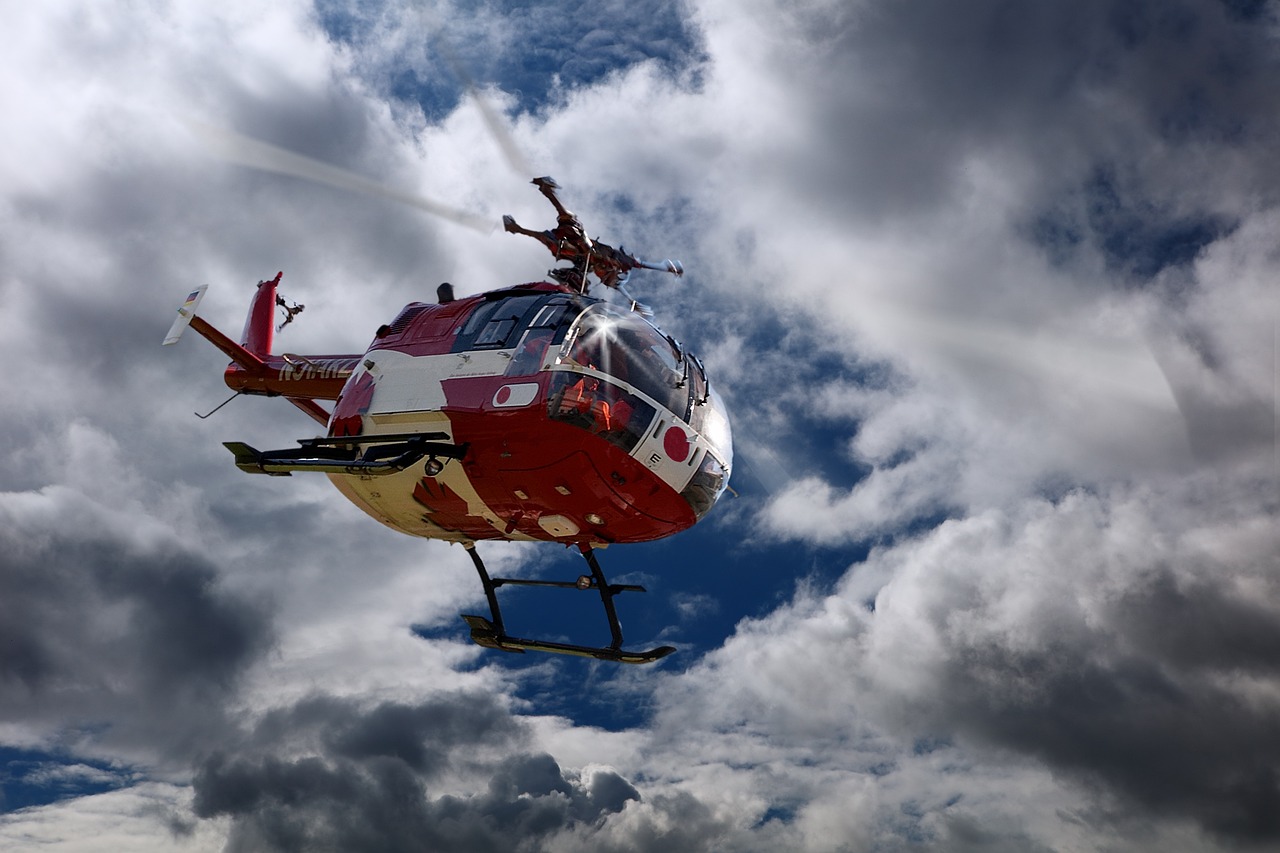
Training and Certification Requirements
Becoming a paramedic or an Emergency Medical Technician (EMT) is no walk in the park; it requires a significant commitment to education and training. The journey typically begins with obtaining a high school diploma or equivalent. From there, aspiring paramedics and EMTs must complete a specialized training program that is accredited by the appropriate regulatory bodies. These programs can vary in length, generally ranging from 6 months to 2 years, depending on the level of certification sought.
Once the foundational training is complete, candidates must pass a certification exam to become licensed. This exam assesses their knowledge in various essential areas, including anatomy, patient assessment, and emergency response techniques. It's not just about passing a test; it's about ensuring that these professionals are equipped to handle life-and-death situations effectively. For instance, a paramedic might face a scenario where they need to quickly assess a patient's condition and make critical decisions that could save a life. The pressure is immense, and the stakes are high!
In many regions, continuing education is also a requirement for maintaining certification. This means that once you become a paramedic or EMT, the learning doesn't stop there! Professionals are often required to complete a certain number of hours in continuing education every few years to stay current with the latest medical practices and technologies. This ongoing training is crucial as it helps them adapt to new challenges and improve their skills continuously.
Here’s a quick overview of the typical training and certification requirements:
| Certification Level | Training Duration | Certification Exam |
|---|---|---|
| EMT Basic | 6 months | NREMT Exam |
| Advanced EMT | 1 year | NREMT Exam |
| Paramedic | 1-2 years | NREMT Exam |
In addition to formal education, aspiring paramedics and EMTs must develop a range of skills that are critical for success in the field. These include strong communication skills, the ability to work under pressure, and excellent problem-solving abilities. They also need to be physically fit, as the job often requires lifting and moving patients in challenging situations. It’s a demanding career, but for those who are passionate about helping others, the rewards can be incredibly fulfilling.

Challenges Faced by Paramedics
Being a paramedic is not just a job; it's a calling filled with both rewarding moments and significant challenges. Imagine rushing into a chaotic scene where every second counts, and your decisions can mean the difference between life and death. This pressure can be overwhelming, and it’s just one of the many challenges paramedics face daily. The emotional toll is immense, as they witness traumatic events and often deal with the aftermath of tragedies, which can lead to mental health issues such as PTSD.
Moreover, paramedics work in unpredictable environments, which can range from busy urban streets to remote areas with limited access to resources. This unpredictability can lead to a myriad of challenges, including:
- High-Stress Situations: The nature of emergencies means that paramedics must remain calm and focused, even when faced with life-threatening situations.
- Physical Demands: The job often requires lifting and transporting patients, which can be physically taxing and lead to injuries.
- Shift Work: Paramedics often work long hours, including nights, weekends, and holidays, which can disrupt their personal lives and lead to fatigue.
In addition to these challenges, paramedics must also navigate complex relationships with patients and their families. They often have to communicate difficult news or manage the emotions of loved ones in distressing situations. This requires not only technical skills but also a high degree of empathy and interpersonal communication.
Furthermore, the evolving nature of healthcare means that paramedics must continuously update their skills and knowledge. They often face challenges related to the integration of new technologies and protocols, which can be daunting, especially when working under pressure. Training programs are rigorous, but the learning never stops. Paramedics must stay current with the latest medical practices and emergency response techniques to provide the best care possible.
Ultimately, while the challenges faced by paramedics are significant, their commitment to serving the community and saving lives is what drives them forward. It’s a tough job, but for those who thrive in high-pressure environments and are passionate about helping others, the rewards can be immeasurable.
Q1: What qualifications do I need to become a paramedic?
A1: To become a paramedic, you typically need a high school diploma or GED, followed by completion of a training program that leads to certification as an EMT or paramedic. Many programs also require clinical experience.
Q2: How do paramedics handle the emotional stress of their job?
A2: Many paramedics utilize coping strategies such as peer support, counseling, and stress management techniques to handle the emotional demands of their work. It’s crucial for them to have a strong support system.
Q3: What is the job outlook for paramedics?
A3: The job outlook for paramedics is generally positive, with a growing demand for emergency medical services due to increasing populations and the need for immediate medical care.
Q4: Can paramedics specialize in certain areas?
A4: Yes, paramedics can specialize in areas such as critical care, flight paramedic services, or tactical paramedicine, which often require additional training and certification.

Firefighting as a Career
Firefighting is not just a job; it's a calling that requires immense bravery, resilience, and a strong sense of duty. Firefighters are often the first responders to emergencies, racing against time to save lives and protect property. Their role is crucial in our communities, and it goes beyond just putting out fires. They are involved in various activities, including fire prevention, education, and rescue operations. The daily tasks of a firefighter can be both physically demanding and mentally challenging, making it essential for them to be well-trained and prepared for anything.
To embark on this rewarding career, aspiring firefighters must undergo specialized training. Fire academies provide rigorous programs that cover a wide range of topics, from fire science to emergency medical care. The training typically includes:
- Physical fitness and strength training
- Fire behavior and suppression techniques
- Hazardous materials handling
- Rescue operations and first aid
This comprehensive training ensures that firefighters are equipped to handle the unpredictable nature of their job. Additionally, many firefighters hold certifications as Emergency Medical Technicians (EMTs), which enhances their ability to provide critical care in emergencies.
The path to becoming a firefighter can vary, but it often includes a combination of education, training, and experience. Many fire departments require candidates to have a high school diploma or equivalent, and some may prefer or require an associate's or bachelor's degree in fire science or a related field. After completing the necessary education, candidates typically need to pass a series of tests, including physical agility tests and written exams, to qualify for the position.
Beyond the technical skills required, the emotional and psychological aspects of firefighting are significant. Firefighters often face life-threatening situations, and the stress of such experiences can take a toll. They must learn to cope with the aftermath of traumatic incidents while maintaining their mental well-being. Support systems, such as peer counseling and mental health resources, are vital for helping firefighters navigate the emotional challenges of their work.
In terms of career progression, firefighters have opportunities to advance into specialized roles, such as:
- Fire Captain
- Fire Chief
- Fire Investigator
- Public Fire Safety Educator
These roles often come with increased responsibilities and the chance to lead teams, develop training programs, or engage with the community on fire safety initiatives. The journey within the firefighting profession is not just about fighting fires; it's about making a lasting impact in the community and being a beacon of hope in times of crisis.
In conclusion, a career in firefighting is both challenging and fulfilling. It requires a unique blend of physical prowess, technical knowledge, and emotional strength. For those who are passionate about serving their communities and are willing to face the heat, firefighting offers a path filled with purpose and adventure.
Q: What is the average salary of a firefighter?
A: The average salary can vary widely depending on location, experience, and department size, but it typically ranges from $40,000 to $100,000 annually.
Q: How long does it take to become a firefighter?
A: The time it takes can vary. Training programs can last from a few months to two years, depending on the level of education and certification pursued.
Q: Are firefighters required to have a college degree?
A: While a college degree is not always required, many fire departments prefer candidates with some level of post-secondary education, particularly in fire science or emergency management.
Q: What are the physical requirements for firefighters?
A: Firefighters must be in excellent physical condition. They typically undergo physical fitness tests that assess strength, endurance, and agility.
Q: Can women become firefighters?
A: Absolutely! Firefighting is open to everyone, regardless of gender. Many women have made significant contributions to the field and continue to break barriers.
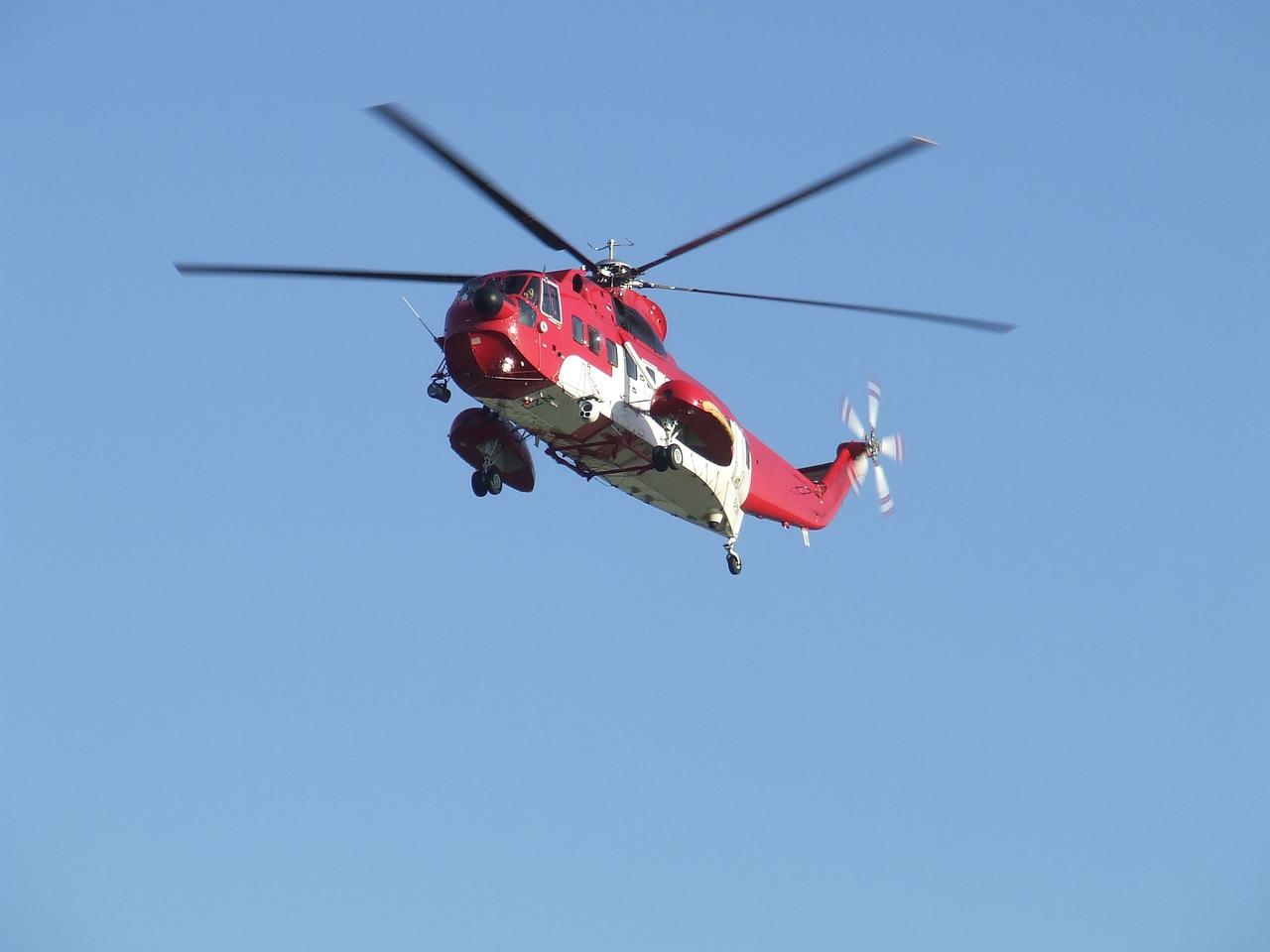
Disaster Management and Relief Coordination
Disaster management and relief coordination play a pivotal role in ensuring that communities can effectively respond to and recover from unexpected crises. Whether it's a natural disaster like a hurricane or an unforeseen event such as a terrorist attack, these professionals are the backbone of any emergency response system. They are tasked with the critical job of not only managing the immediate response but also planning for recovery and future preparedness. The importance of their role cannot be overstated; they are the ones who help communities bounce back, often from the brink of despair.
To excel in disaster management, individuals must develop a unique set of skills that allows them to navigate the complexities of emergency situations. Leadership is paramount. In the heat of a crisis, effective leaders inspire confidence and provide direction, ensuring that all team members understand their roles. Coupled with strong leadership is the need for excellent communication skills. Coordinators must relay vital information to various stakeholders, including government agencies, non-profits, and the affected communities. This communication must be clear, concise, and timely, as lives can depend on the information shared.
Another essential skill is the ability to think critically and analyze situations quickly. Emergencies are often chaotic, and the ability to assess a situation and make informed decisions can significantly impact the outcome of a disaster response. Furthermore, disaster managers often work in teams, requiring strong collaboration skills to ensure all parties are on the same page. The ability to work under pressure while maintaining a calm demeanor is a hallmark of successful disaster coordinators.
In addition to these soft skills, technical competencies are also crucial. Familiarity with emergency management software, logistics planning, and resource allocation are vital for effective disaster coordination. Professionals often utilize various tools and technologies to streamline their efforts, ensuring that resources are deployed efficiently. For example, Geographic Information Systems (GIS) can be invaluable for mapping disaster areas and planning response strategies.
Career pathways in disaster relief can vary widely. Many professionals start their journey through volunteering, gaining hands-on experience that is invaluable in this field. Others may pursue formal education in emergency management, public administration, or related fields. Some organizations even offer certification programs specifically designed to equip individuals with the knowledge and skills needed for disaster management roles. Here’s a brief overview of potential pathways:
| Pathway | Description |
|---|---|
| Volunteering | Gain practical experience through local organizations and community initiatives. |
| Formal Education | Pursue degrees in emergency management, public safety, or related fields. |
| Certification Programs | Complete specialized training to enhance skills and knowledge in disaster response. |
Ultimately, a career in disaster management and relief coordination is not just about the job; it’s about making a difference. These professionals are on the front lines during some of the most challenging moments in people’s lives. Their work is often emotionally taxing, yet incredibly rewarding. By dedicating themselves to this field, they contribute to building resilient communities capable of withstanding and recovering from crises.
- What qualifications do I need to enter disaster management? Most positions require at least a bachelor's degree in a related field, along with relevant certifications.
- Is volunteering a good way to start a career in disaster management? Absolutely! Volunteering provides valuable experience and networking opportunities.
- What skills are most important in disaster management? Key skills include leadership, communication, critical thinking, and technical competencies in emergency management tools.
- Can I work in disaster management part-time? Yes, many organizations offer part-time roles or project-based work in disaster response.

Skills for Effective Disaster Management
In the realm of disaster management, possessing the right skills is not just beneficial; it’s essential. Think of it as being the captain of a ship during a storm. You need to navigate through turbulent waters, make quick decisions, and ensure the safety of your crew. Similarly, disaster managers must be equipped with a unique set of competencies to tackle the unpredictable nature of emergencies. Here are some of the most critical skills that can make a difference:
- Leadership: A disaster manager often finds themselves in charge during a crisis. Strong leadership skills are vital for rallying teams, making decisions, and instilling confidence in those around you.
- Communication: Clear and effective communication can be the difference between chaos and order. Whether it’s briefing emergency responders or informing the public, the ability to convey information accurately is crucial.
- Analytical Thinking: The ability to assess situations quickly and make informed decisions is paramount. Disaster managers must analyze data, understand risks, and develop strategies on the fly.
- Problem-Solving: In the face of unexpected challenges, a disaster manager must think creatively and resourcefully. Finding solutions under pressure is a daily requirement in this field.
- Emotional Resilience: Disasters can be emotionally taxing. Managers must handle stress effectively and support their teams, maintaining morale even in the toughest situations.
These skills are not merely theoretical; they are honed through experience and education. Many disaster management professionals undergo specialized training to develop these competencies. For instance, leadership skills can be enhanced through workshops and mentorship programs, while analytical thinking can be sharpened through simulations that mimic real-life disaster scenarios. Additionally, emotional resilience is often built through exposure to high-stress environments, allowing individuals to learn coping strategies that can be applied during actual emergencies.
Moreover, collaboration is another crucial aspect of effective disaster management. Working alongside various agencies, including local governments, non-profits, and international organizations, requires an understanding of different perspectives and operational methods. Being able to foster teamwork and build partnerships can significantly enhance the efficacy of disaster response efforts.
To summarize, the skills necessary for effective disaster management are multifaceted and require continuous development. By focusing on leadership, communication, analytical thinking, problem-solving, emotional resilience, and collaboration, aspiring disaster managers can prepare themselves to face the challenges that lie ahead. As the saying goes, “Preparation is the key to success,” and in disaster management, this couldn’t be more accurate.
Q: What qualifications do I need to pursue a career in disaster management?
A: While specific qualifications can vary, a degree in emergency management, public health, or a related field is often beneficial. Additionally, certifications from recognized institutions can enhance your credentials.
Q: Is prior experience necessary for entering this field?
A: While prior experience can be advantageous, many entry-level positions offer training. Volunteering in emergency services or non-profits can also provide valuable experience.
Q: What are the job prospects in disaster management?
A: The job outlook for disaster management professionals is promising, especially as climate change and natural disasters continue to pose significant risks globally. Opportunities exist in government agencies, non-profits, and private sectors.
Q: How can I improve my skills for disaster management?
A: Engaging in training programs, attending workshops, and gaining hands-on experience through volunteering or internships can significantly enhance your skills in this field.
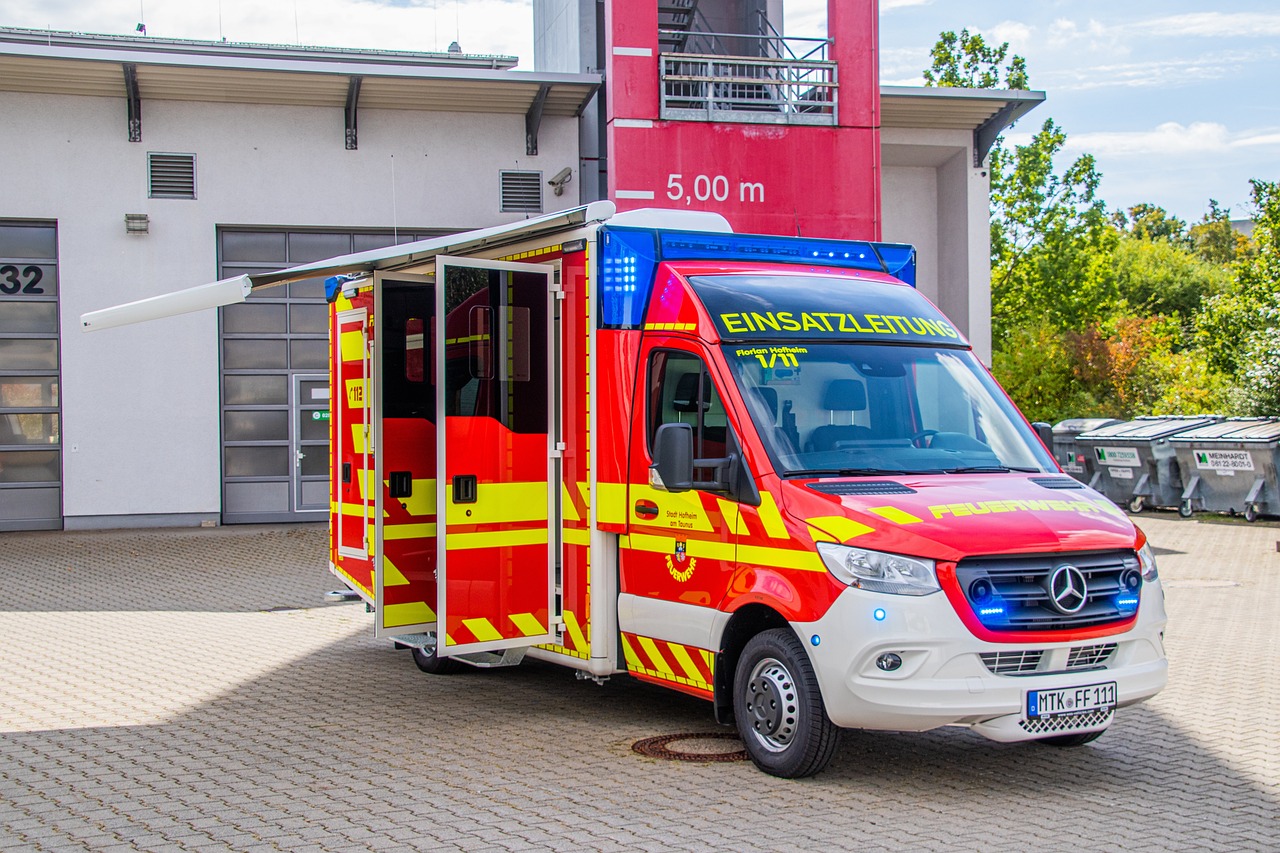
Career Pathways in Disaster Relief
Embarking on a career in disaster relief is not just a job; it's a calling that requires passion, resilience, and a desire to make a tangible difference in the lives of those affected by crises. There are numerous pathways that individuals can take to enter this impactful field, and understanding these routes can help aspiring professionals find their niche. Whether you’re a seasoned volunteer or someone considering a career change, the options are diverse and fulfilling.
One of the most common ways to enter the disaster relief sector is through volunteering. Many organizations, such as the Red Cross or local NGOs, offer volunteer opportunities that provide hands-on experience in emergency situations. Volunteering not only allows individuals to contribute to their communities but also helps them develop essential skills and build a network of contacts within the industry. This experience can often lead to paid positions or internships, as organizations frequently look to promote from within.
Another pathway is pursuing formal education in fields related to disaster management. Many universities and colleges now offer specialized programs in emergency management, public safety, or humanitarian aid. These programs often combine theoretical knowledge with practical training, equipping students with the skills needed to navigate complex disaster scenarios. For example, a degree in emergency management might cover topics such as risk assessment, crisis communication, and resource allocation, all of which are crucial for effective disaster response.
Moreover, certifications can significantly enhance one’s employability in this sector. Various organizations offer certification programs that focus on specific skills relevant to disaster relief, such as first aid, emergency response planning, and logistics management. Obtaining these certifications not only demonstrates a commitment to the field but also provides individuals with a competitive edge when applying for jobs. Here’s a quick overview of some popular certifications:
| Certification | Offered By | Focus Area |
|---|---|---|
| Certified Emergency Manager (CEM) | International Association of Emergency Managers | Comprehensive emergency management |
| Disaster Recovery Institute (DRI) Certification | Disaster Recovery Institute International | Business continuity and disaster recovery |
| Red Cross First Aid/CPR/AED | American Red Cross | Basic emergency response skills |
Additionally, many individuals transition into disaster relief careers from other fields such as healthcare, engineering, or social work. The skills acquired in these professions can be highly transferable. For example, a nurse may find their medical expertise invaluable in a disaster situation, while an engineer might contribute significantly to rebuilding efforts after a natural disaster. Recognizing the value of diverse backgrounds can enrich the disaster response team and lead to more effective solutions.
In conclusion, the pathways to a career in disaster relief are as varied as the challenges faced in emergencies. Whether through volunteering, formal education, certifications, or leveraging existing skills from other professions, there are numerous ways to make a meaningful impact. If you have the heart to help and the drive to learn, the world of disaster relief is waiting for you to step in and make a difference.
- What qualifications do I need to work in disaster relief? While formal qualifications can be beneficial, many roles value experience and a willingness to learn. Volunteering can be a great starting point.
- Are there job opportunities in disaster relief internationally? Yes! Many organizations operate globally and often seek professionals for international assignments.
- How can I find volunteer opportunities in disaster relief? Check local NGOs, community centers, and organizations like the Red Cross for current volunteer openings.
- What skills are most important in disaster relief? Key skills include leadership, communication, adaptability, and problem-solving abilities.
Frequently Asked Questions
- What types of careers are available in emergency response?
Emergency response careers are diverse and can include roles such as paramedics, firefighters, disaster relief coordinators, and emergency management specialists. Each of these positions plays a crucial role in ensuring public safety and providing aid during crises.
- What qualifications do I need to become a paramedic or EMT?
To become a paramedic or EMT, you typically need to complete a state-approved training program, which includes both classroom instruction and hands-on clinical experience. Certification exams are also required, and candidates must meet specific physical and mental health standards.
- What challenges do paramedics face on the job?
Paramedics often work in high-stress environments where they must make quick decisions. They face emotional challenges due to the nature of emergencies and the need to provide care in life-or-death situations. Additionally, they may deal with unpredictable patient behaviors and difficult working conditions.
- How does one become a firefighter?
Becoming a firefighter usually requires completing a fire academy training program, which includes physical fitness training, firefighting techniques, and emergency medical training. Additionally, candidates often need to pass written exams, physical tests, and background checks.
- What skills are essential for disaster management professionals?
Effective disaster management professionals need strong leadership, communication, and analytical skills. They must be able to coordinate with various agencies, make strategic decisions quickly, and manage resources efficiently during emergencies.
- Are there educational pathways for careers in disaster relief?
Yes! There are several educational pathways for entering disaster relief careers, including formal degrees in emergency management, public health, or related fields. Additionally, volunteering for organizations like the Red Cross can provide valuable experience and networking opportunities.
- What is the job outlook for careers in emergency response?
The job outlook for careers in emergency response is generally positive, with increasing demand for skilled professionals in this field. As communities face more frequent natural disasters and public health emergencies, the need for trained responders continues to grow.

